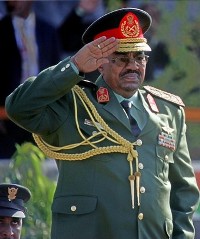TIMELINE: Sudan president Omer Al-Bashir
1944: Omer Hassan Al-Bashir is born in the northern Sudan village of Hosh Banaga.

1973: Served with the Egyptian army during the Yom Kippur war.
1989: Brigadier Al-Bashir is chosen by the National Islamic Front (NIF) and its leader Hassan Al-Turabi to lead a coup ousting the government led by Prime Minister Sadiq Al-Mahdi. He is proclaimed as Chairman of the Revolutionary Command Council for National Salvation.
1993: The Revolutionary Command Council for National Salvation is dissolved and Bashir is announced as president of Sudan.
1996: Al-Bashir wins the presidential elections with 75.7% of the votes. All major parties boycotted the elections.
1999: Al-Turabi who was parliament speaker introduced a bill to curb the president’s powers, after which Al-Bashir dissolved the parliament and declare a state of emergency following backing by the army and major figures at the NIF.
2000: Al-Bashir is reelected for a second five years term receiving 86.5% of the votes.
2001: The Sudanese president orders the arrest of Al-Turabi on allegations that he was trying to overthrow the government.
2003: Two Darfur rebel groups rise up, saying government neglects arid region and arms Arab militia against civilians.
2004: The UN says Darfur has become one of the world’s worst humanitarian crises. Washington labels the Darfur conflict as genocide.
2005: The ruling National Congress Party (NCP) led by Bashir and Sudan People Liberation Movement (SPLM) led by John Garang sign a peace agreement ending two decades of civil war between North and South.
2006: Al-Bashir refuses to accept UN peacekeepers in Darfur accusing the world body of ‘neo-colonialism’.
2008: The prosecutor of the International Criminal Court (ICC) Luis Moreno-Ocampo requests an arrest warrant for Al-Bashir including three counts of genocide, five of crimes against humanity and two of murder. The charges are connected to the conflict that broke out in Darfur in 2003.
(ST)
